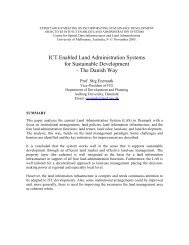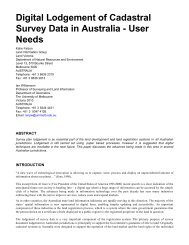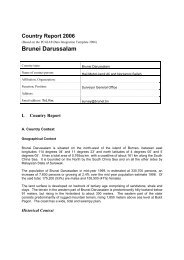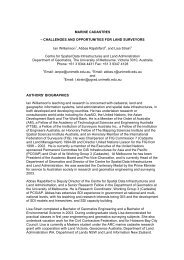- Page 1:
A Local-State Government Spatial Da
- Page 5 and 6:
Abstract In the past decade efforts
- Page 7 and 8:
Acknowledgements Completion of a Ph
- Page 9 and 10:
Table of Contents DECLARATION .....
- Page 11 and 12:
APPENDIX 5 - INTER-STATE DIFFERENCE
- Page 13 and 14:
FIGURE 6.7 USE OF WEB MAPPING .....
- Page 15 and 16:
List of Acronyms ACT AUSTRALIAN CAP
- Page 17 and 18:
Operational Definitions The followi
- Page 19 and 20:
1 Chapter 1 Introduction Chapter 1
- Page 21 and 22:
1.1 Background to Research 3 Chapte
- Page 23 and 24:
5 Chapter 1 - Introduction is havin
- Page 25 and 26:
7 Chapter 1 - Introduction enforcem
- Page 27 and 28:
9 Chapter 1 - Introduction The rese
- Page 29 and 30:
11 Chapter 1 - Introduction organis
- Page 31 and 32:
13 Chapter 1 - Introduction three c
- Page 33 and 34:
15 Chapter 2 - Spatial Data and SDI
- Page 35 and 36:
2.1 Introduction 17 Chapter 2 - Spa
- Page 37 and 38:
19 Chapter 2 - Spatial Data and SDI
- Page 39 and 40:
21 Chapter 2 - Spatial Data and SDI
- Page 41 and 42:
23 Chapter 2 - Spatial Data and SDI
- Page 43 and 44:
25 Chapter 2 - Spatial Data and SDI
- Page 45 and 46:
2.2.6 Property Information as a Fun
- Page 47 and 48:
29 Chapter 2 - Spatial Data and SDI
- Page 49 and 50:
31 Chapter 2 - Spatial Data and SDI
- Page 51 and 52:
33 Chapter 2 - Spatial Data and SDI
- Page 53 and 54:
35 Chapter 2 - Spatial Data and SDI
- Page 55 and 56:
37 Chapter 2 - Spatial Data and SDI
- Page 57 and 58:
39 Chapter 2 - Spatial Data and SDI
- Page 59 and 60:
41 Chapter 2 - Spatial Data and SDI
- Page 61 and 62:
43 Chapter 2 - Spatial Data and SDI
- Page 63 and 64:
45 Chapter 2 - Spatial Data and SDI
- Page 65 and 66:
47 Chapter 2 - Spatial Data and SDI
- Page 67 and 68:
49 Chapter 2 - Spatial Data and SDI
- Page 69 and 70:
51 Chapter 2 - Spatial Data and SDI
- Page 71 and 72:
53 Chapter 2 - Spatial Data and SDI
- Page 73 and 74:
Chapter 3 - Collaboration, Partners
- Page 75 and 76:
3.1 Introduction Chapter 3 - Collab
- Page 77 and 78:
Chapter 3 - Collaboration, Partners
- Page 79 and 80:
Chapter 3 - Collaboration, Partners
- Page 81 and 82:
Chapter 3 - Collaboration, Partners
- Page 83 and 84:
Chapter 3 - Collaboration, Partners
- Page 85 and 86:
Dimensions Actors Lower ranking mem
- Page 87 and 88:
Chapter 3 - Collaboration, Partners
- Page 89 and 90:
Chapter 3 - Collaboration, Partners
- Page 91 and 92:
Chapter 3 - Collaboration, Partners
- Page 93 and 94:
Chapter 3 - Collaboration, Partners
- Page 95 and 96:
Chapter 3 - Collaboration, Partners
- Page 97 and 98:
Chapter 3 - Collaboration, Partners
- Page 99 and 100:
Chapter 3 - Collaboration, Partners
- Page 101 and 102:
Chapter 3 - Collaboration, Partners
- Page 103 and 104:
Chapter 3 - Collaboration, Partners
- Page 105 and 106: Chapter 3 - Collaboration, Partners
- Page 107 and 108: Chapter 3 - Collaboration, Partners
- Page 109 and 110: 91 Chapter 4 - Research Design and
- Page 111 and 112: 4.1 Introduction 93 Chapter 4 - Res
- Page 113 and 114: 95 Chapter 4 - Research Design and
- Page 115 and 116: 97 Chapter 4 - Research Design and
- Page 117 and 118: 99 Chapter 4 - Research Design and
- Page 119 and 120: 101 Chapter 4 - Research Design and
- Page 121 and 122: 103 Chapter 4 - Research Design and
- Page 123 and 124: 105 Chapter 4 - Research Design and
- Page 125 and 126: 107 Chapter 4 - Research Design and
- Page 127 and 128: 109 Chapter 4 - Research Design and
- Page 129 and 130: 111 Chapter 4 - Research Design and
- Page 131 and 132: 113 Chapter 4 - Research Design and
- Page 133 and 134: Chapter 5 - Results of Partnership
- Page 135 and 136: 5.1 Introduction Chapter 5 - Result
- Page 137 and 138: Employees '000s 500.0 450.0 400.0 3
- Page 139 and 140: Chapter 5 - Results of Partnership
- Page 141 and 142: Chapter 5 - Results of Partnership
- Page 143 and 144: Data Exchange Process Chapter 5 - R
- Page 145 and 146: Chapter 5 - Results of Partnership
- Page 147 and 148: Chapter 5 - Results of Partnership
- Page 149 and 150: Chapter 5 - Results of Partnership
- Page 151 and 152: Chapter 5 - Results of Partnership
- Page 153 and 154: Chapter 5 - Results of Partnership
- Page 155: Chapter 5 - Results of Partnership
- Page 159 and 160: Employees '000s 60.0 50.0 40.0 30.0
- Page 161 and 162: Chapter 5 - Results of Partnership
- Page 163 and 164: Chapter 5 - Results of Partnership
- Page 165 and 166: Chapter 5 - Results of Partnership
- Page 167 and 168: Chapter 5 - Results of Partnership
- Page 169 and 170: Chapter 5 - Results of Partnership
- Page 171 and 172: Chapter 5 - Results of Partnership
- Page 173 and 174: Chapter 5 - Results of Partnership
- Page 175 and 176: Chapter 6 - Results of Partnership
- Page 177 and 178: 6.1 Introduction Chapter 6 - Result
- Page 179 and 180: Chapter 6 - Results of Partnership
- Page 181 and 182: Chapter 6 - Results of Partnership
- Page 183 and 184: Chapter 6 - Results of Partnership
- Page 185 and 186: Chapter 6 - Results of Partnership
- Page 187 and 188: Percent 60.0% 50.0% 40.0% 30.0% 20.
- Page 189 and 190: Chapter 6 - Results of Partnership
- Page 191 and 192: Chapter 6 - Results of Partnership
- Page 193 and 194: Chapter 6 - Results of Partnership
- Page 195 and 196: Equality in Collaborations Chapter
- Page 197 and 198: Chapter 6 - Results of Partnership
- Page 199 and 200: % of LGAs For Each State 60.0% 40.0
- Page 201 and 202: Chapter 6 - Results of Partnership
- Page 203 and 204: Chapter 6 - Results of Partnership
- Page 205 and 206: Chapter 6 - Results of Partnership
- Page 207 and 208:
Chapter 6 - Results of Partnership
- Page 209 and 210:
Chapter 6 - Results of Partnership
- Page 211 and 212:
Chapter 6 - Results of Partnership
- Page 213 and 214:
195 Chapter 7 - Model Development a
- Page 215 and 216:
7.1 Introduction 197 Chapter 7 - Mo
- Page 217 and 218:
199 Chapter 7 - Model Development a
- Page 219 and 220:
7.3 The Data Sharing Partnership Mo
- Page 221 and 222:
203 Chapter 7 - Model Development a
- Page 223 and 224:
205 Chapter 7 - Model Development a
- Page 225 and 226:
Partnership Management Partnership
- Page 227 and 228:
Performance Monitoring 209 Chapter
- Page 229 and 230:
211 Chapter 7 - Model Development a
- Page 231 and 232:
213 Chapter 7 - Model Development a
- Page 233 and 234:
7.4.4 Assessment of the Outcome Com
- Page 235 and 236:
SDI Component - Standards Access Ne
- Page 237 and 238:
219 Chapter 7 - Model Development a
- Page 239 and 240:
221 Chapter 7 - Model Development a
- Page 241 and 242:
223 Conclusions and Implications 8
- Page 243 and 244:
8.1 Introduction 225 Conclusions an
- Page 245 and 246:
227 Conclusions and Implications 8.
- Page 247 and 248:
229 Conclusions and Implications ca
- Page 249 and 250:
231 Conclusions and Implications pa
- Page 251 and 252:
References 233 References Reference
- Page 253 and 254:
235 References Cameron, D 2001, 'Th
- Page 255 and 256:
237 References Department of Foreig
- Page 257 and 258:
239 References Hesse, WJ & Williams
- Page 259 and 260:
241 References Masser, I 2002, Repo
- Page 261 and 262:
243 References Onsrud, HJ & Rushton
- Page 263 and 264:
Tashakkori, A & Teddlie, C (eds) 20
- Page 265 and 266:
247 References
- Page 267 and 268:
Appendix 1 - Publications Relating
- Page 269 and 270:
Appendix 1 - Publications Relating
- Page 271 and 272:
Appendix 2 - Semi Structured Interv
- Page 273 and 274:
Appendix 2 - Semi Structured Interv
- Page 275 and 276:
Appendix 3 257 Appendix 3 - Local G
- Page 277 and 278:
259 Appendix 3 - Local Government Q
- Page 279 and 280:
Part 1 - Your Organisation 261 Appe
- Page 281 and 282:
263 Appendix 3 - Local Government Q
- Page 283 and 284:
Q4e: The costs to acquire State gov
- Page 285 and 286:
Part 6 - About People 267 Appendix
- Page 287 and 288:
269 Appendix 3 - Local Government Q
- Page 289 and 290:
271 Appendix 3 - Local Government Q
- Page 291 and 292:
Appendix4 - Open Ended Questionnair
- Page 293 and 294:
Appendix4 - Open Ended Questionnair
- Page 295 and 296:
Appendix4 - Open Ended Questionnair
- Page 297 and 298:
Appendix4 - Open Ended Questionnair
- Page 299 and 300:
Appendix4 - Open Ended Questionnair
- Page 301 and 302:
Appendix4 - Open Ended Questionnair
- Page 303 and 304:
Appendix4 - Open Ended Questionnair
- Page 305 and 306:
Appendix4 - Open Ended Questionnair
- Page 307 and 308:
54 Provision of Aerial photos at a
- Page 309 and 310:
Appendix4 - Open Ended Questionnair
- Page 311 and 312:
APPENDIX 5 293 Appendix 5 - Inter-S
- Page 313 and 314:
ANOVA ANALYSIS 295 Appendix 5 - Int
- Page 315 and 316:
297 Appendix 5 - Inter-State Differ
- Page 317 and 318:
Kruskal Wallis Test Statistics(a,b)
- Page 319 and 320:
APPENDIX 6 FACTOR ANALYSIS 301 Appe
- Page 321 and 322:
Communalities 303 Appendix 6 - Fact
- Page 323 and 324:
305 Component Matrix(a) Component A
- Page 325 and 326:
APPENDIX 7 307 Appendix 7 - Correla
- Page 327 and 328:
Size_Index Org_support Ext_access_p
- Page 329 and 330:
APPENDIX 8 311 Appendix 8 - Multipl
- Page 331 and 332:
Variables Entered/Removed(b) Model







